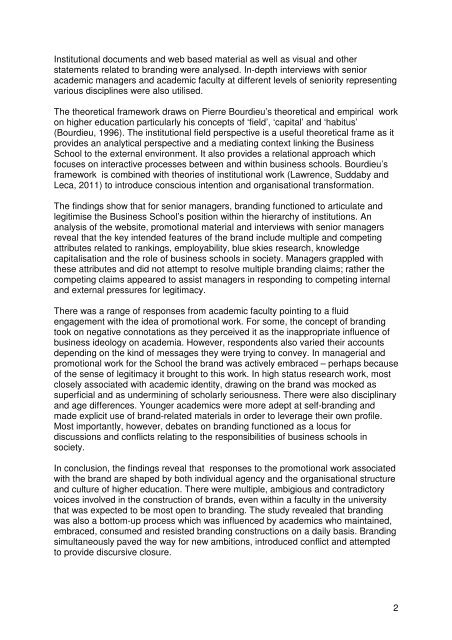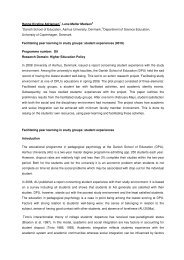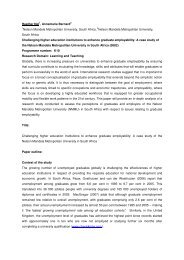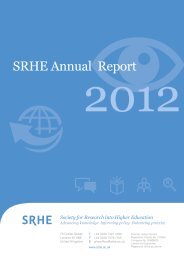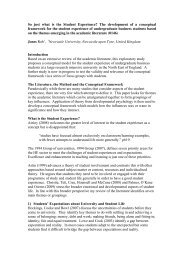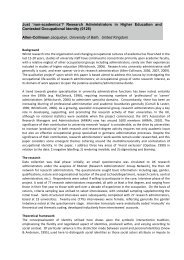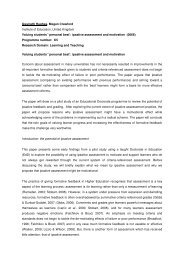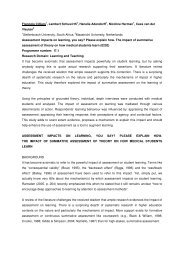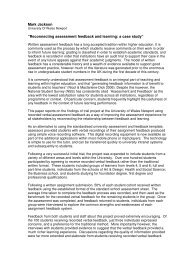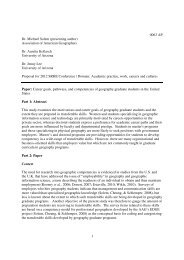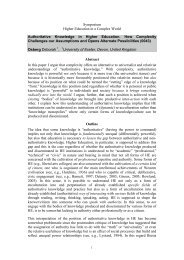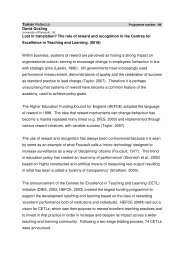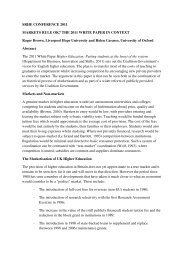Academic Struggles with Promotional Work - Society for Research ...
Academic Struggles with Promotional Work - Society for Research ...
Academic Struggles with Promotional Work - Society for Research ...
You also want an ePaper? Increase the reach of your titles
YUMPU automatically turns print PDFs into web optimized ePapers that Google loves.
Institutional documents and web based material as well as visual and other<br />
statements related to branding were analysed. In-depth interviews <strong>with</strong> senior<br />
academic managers and academic faculty at different levels of seniority representing<br />
various disciplines were also utilised.<br />
The theoretical framework draws on Pierre Bourdieu’s theoretical and empirical work<br />
on higher education particularly his concepts of ‘field’, ‘capital’ and ‘habitus’<br />
(Bourdieu, 1996). The institutional field perspective is a useful theoretical frame as it<br />
provides an analytical perspective and a mediating context linking the Business<br />
School to the external environment. It also provides a relational approach which<br />
focuses on interactive processes between and <strong>with</strong>in business schools. Bourdieu’s<br />
framework is combined <strong>with</strong> theories of institutional work (Lawrence, Suddaby and<br />
Leca, 2011) to introduce conscious intention and organisational trans<strong>for</strong>mation.<br />
The findings show that <strong>for</strong> senior managers, branding functioned to articulate and<br />
legitimise the Business School’s position <strong>with</strong>in the hierarchy of institutions. An<br />
analysis of the website, promotional material and interviews <strong>with</strong> senior managers<br />
reveal that the key intended features of the brand include multiple and competing<br />
attributes related to rankings, employability, blue skies research, knowledge<br />
capitalisation and the role of business schools in society. Managers grappled <strong>with</strong><br />
these attributes and did not attempt to resolve multiple branding claims; rather the<br />
competing claims appeared to assist managers in responding to competing internal<br />
and external pressures <strong>for</strong> legitimacy.<br />
There was a range of responses from academic faculty pointing to a fluid<br />
engagement <strong>with</strong> the idea of promotional work. For some, the concept of branding<br />
took on negative connotations as they perceived it as the inappropriate influence of<br />
business ideology on academia. However, respondents also varied their accounts<br />
depending on the kind of messages they were trying to convey. In managerial and<br />
promotional work <strong>for</strong> the School the brand was actively embraced – perhaps because<br />
of the sense of legitimacy it brought to this work. In high status research work, most<br />
closely associated <strong>with</strong> academic identity, drawing on the brand was mocked as<br />
superficial and as undermining of scholarly seriousness. There were also disciplinary<br />
and age differences. Younger academics were more adept at self-branding and<br />
made explicit use of brand-related materials in order to leverage their own profile.<br />
Most importantly, however, debates on branding functioned as a locus <strong>for</strong><br />
discussions and conflicts relating to the responsibilities of business schools in<br />
society.<br />
In conclusion, the findings reveal that responses to the promotional work associated<br />
<strong>with</strong> the brand are shaped by both individual agency and the organisational structure<br />
and culture of higher education. There were multiple, ambigious and contradictory<br />
voices involved in the construction of brands, even <strong>with</strong>in a faculty in the university<br />
that was expected to be most open to branding. The study revealed that branding<br />
was also a bottom-up process which was influenced by academics who maintained,<br />
embraced, consumed and resisted branding constructions on a daily basis. Branding<br />
simultaneously paved the way <strong>for</strong> new ambitions, introduced conflict and attempted<br />
to provide discursive closure.<br />
2


